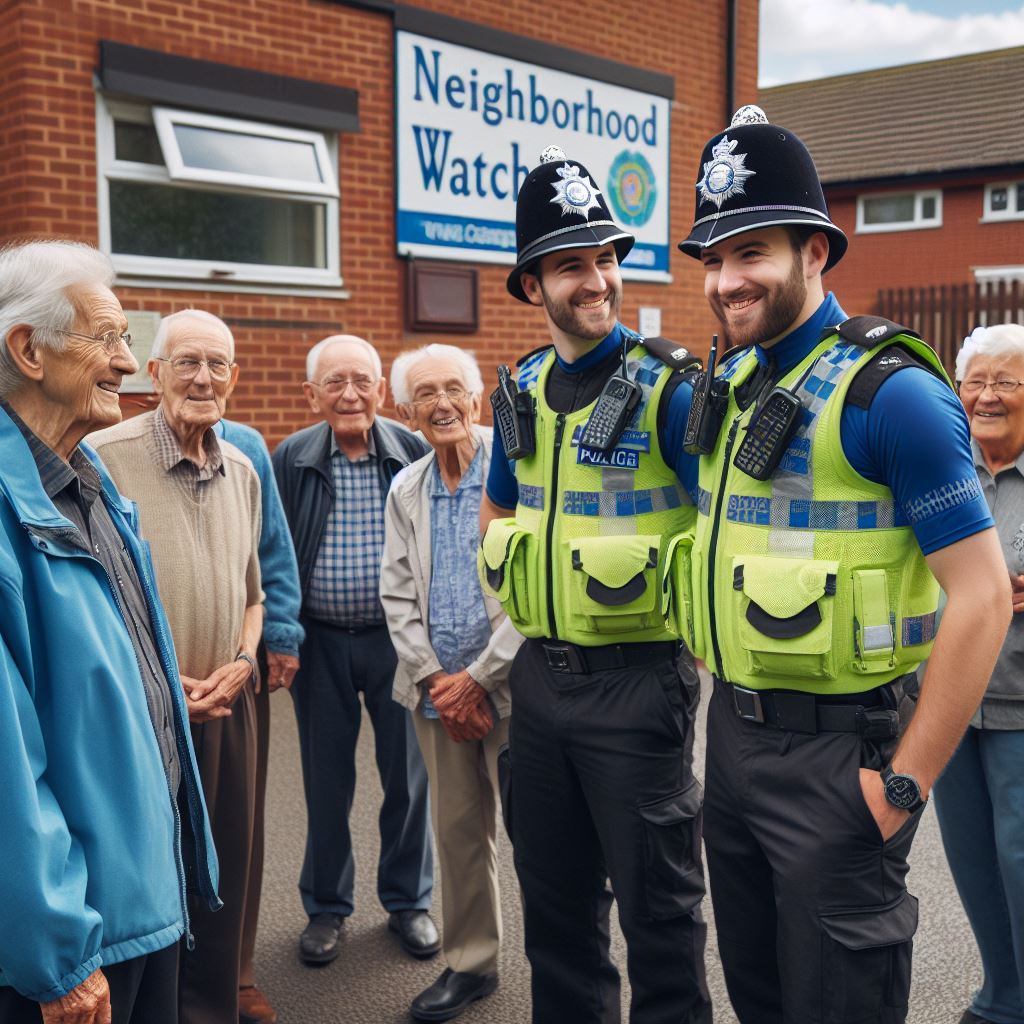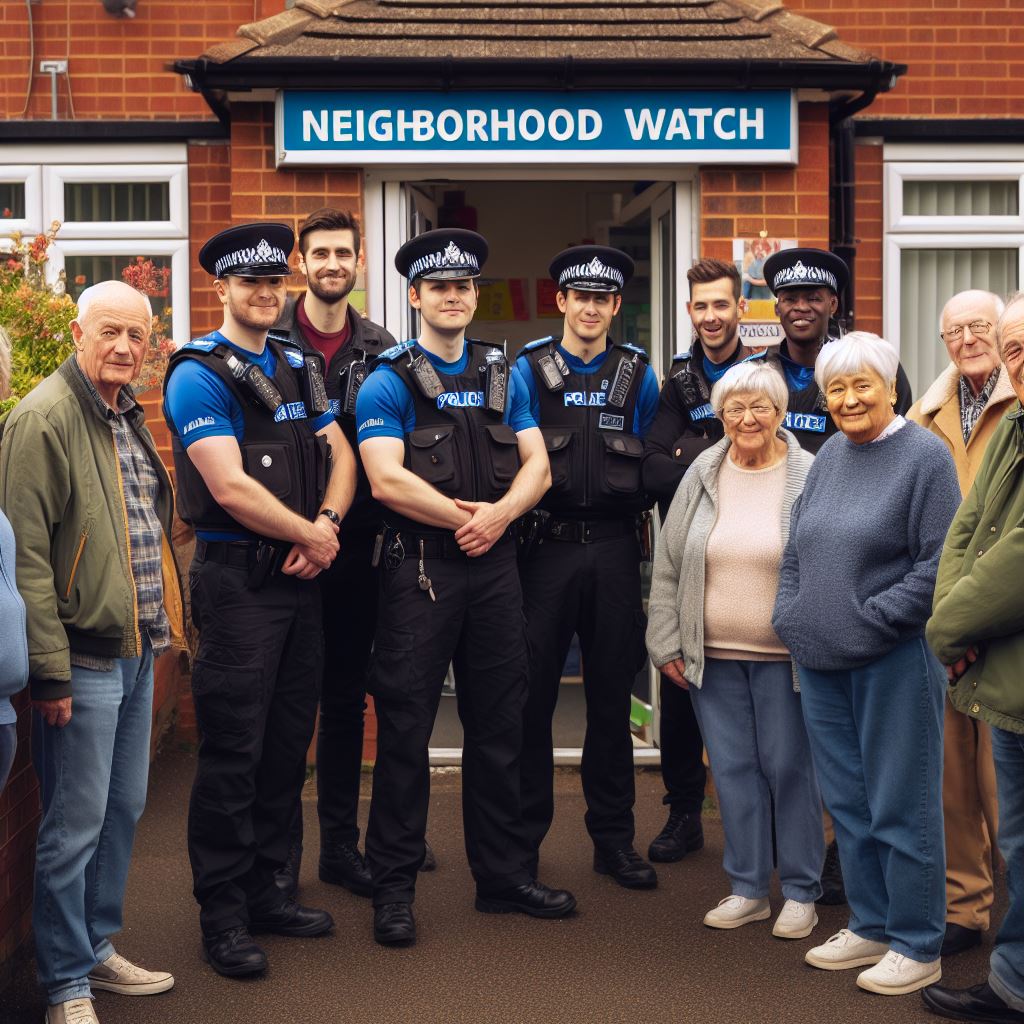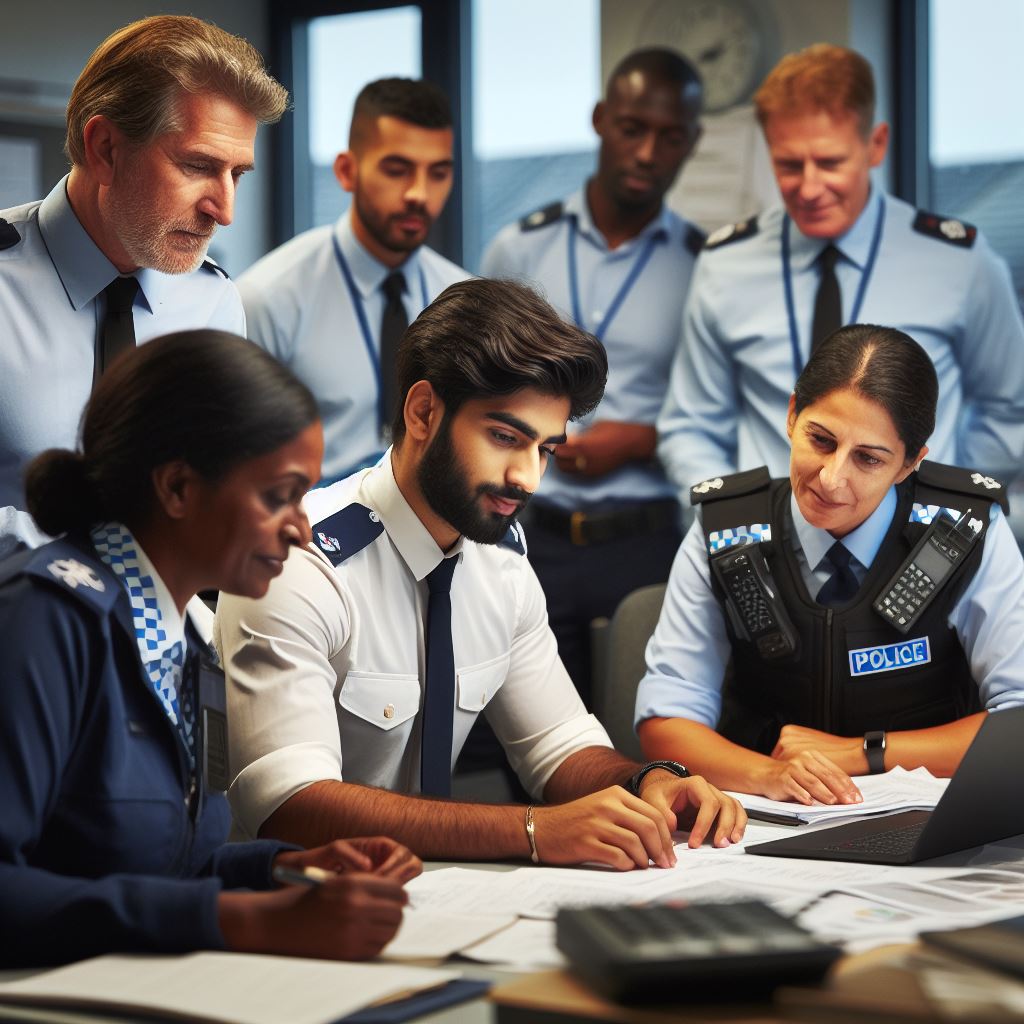Introduction
How Police Work with the Community is crucial for maintaining safety and trust.
Building strong and positive relations between the United Kingdom (UK) police and the community is crucial for maintaining safety and trust.
The effectiveness of the police force is greatly enhanced when they work collaboratively with the community they serve.
This blog section will examine the various ways in which UK police engage with the community to ensure safety and foster trust.
In the UK, police-community relations are of utmost importance as they contribute to crime prevention, prompt response, and effective law enforcement.
Positive relationships enable the police to gather vital intelligence and receive cooperation from the public, leading to improved crime-solving rates and enhanced public safety.
Moreover, strong police-community relations help to address issues of inequality, reduce fear, and build a sense of security within neighborhoods.
The UK police employ a range of strategies to actively collaborate with the community.
These include community policing initiatives, neighborhood forums, regular meetings, and collaboration with community leaders and organizations.
Additionally, the police use social media platforms and community engagement events to connect with residents and foster positive interactions.
Such proactive measures build trust, encourage dialogue, and strengthen relationships among the police and community members.
By working hand in hand with the community, the UK police aim to create an environment in which citizens feel safe, valued, and part of the decision-making process.
This section will delve deeper into the specific methods employed by the UK police and their impact on crime prevention, public safety, and the overall well-being of the community.
Community Policing Philosophy
Community policing is a concept that emphasizes a proactive approach to policing and collaboration between police and community members.
Explanation of the concept of community policing
Community policing is a philosophy that recognizes the importance of involving community members in the prevention and solution of crime.
Personalized UK Career Consulting
Receive tailored career guidance designed just for you. Get actionable steps and expert support to boost your career in 1-3 days. Take control of your career now.
Get StartedIt shifts the focus from reactive responses to proactive strategies.
Emphasis on the proactive approach to policing
Community policing encourages police officers to take a proactive role in addressing community concerns and preventing crime.
It involves building relationships, conducting problem-solving initiatives, and implementing preventive measures.
Importance of collaboration between police and community members
Collaboration between police and community members is crucial for the success of community policing.
It fosters trust, enhances communication, and allows for the development of effective crime prevention strategies tailored to specific community needs.
Read: The Challenges UK Police Officers Face Daily
Regular Patrols and Increased Visibility
Role of police officers in conducting regular patrols within neighborhoods
Regular patrols play a crucial role in UK police officers’ engagement with the community.
They conduct regular patrols within neighborhoods, ensuring that law and order are maintained.
Benefits of increased police presence, such as deterrence and immediate response to incidents
The increased police presence provides numerous benefits, especially in terms of deterrence.
Criminals are less likely to commit offenses when they see a visible police presence in their area. This increased visibility acts as a powerful deterrent, preventing potential incidents.
Moreover, the immediate response to incidents is another advantage of increased police presence.
With officers patrolling the streets, they can quickly respond to emergencies, ensuring public safety and minimizing the impact of criminal activities.
Prompt interventions can prevent crimes from escalating and protect community members.
However, it’s not just about deterring criminal activities or responding to incidents.
Your Dream Job Starts with a Perfect CV
Get a tailored CV and cover letter that captures your unique strengths and stands out in your industry. Let us help you make an unforgettable first impression.
Get StartedUK police officers also focus on building rapport with community members through face-to-face interaction.
This personal connection helps in establishing trust between the police and the residents.
The officers take the time to engage with the community, getting to know the individuals living in the area.
They attend local events, hold neighborhood meetings, and organize community initiatives to foster a sense of togetherness.
By being present and actively involved, the police officers become familiar faces, making it easier for community members to approach them with concerns.
Building rapport with community members through face-to-face interaction
- Face-to-face interaction has proven to be an effective way to understand the specific needs and challenges faced by different neighborhoods.
- By actively engaging with community members, police officers gain valuable insights that help them tailor their approach to policing.
- They can address the unique issues faced by each community, ensuring that their efforts are targeted and relevant.
- Furthermore, regular patrols and increased visibility contribute to the overall perception of safety within neighborhoods.
- When residents see police officers actively patrolling their streets, it creates a sense of security.
- People feel reassured knowing that law enforcement is actively working to keep their community safe.
- This improved perception of safety is vital as it encourages people to take an active role in their community.
- When residents feel secure, they are more likely to engage in activities that promote neighborhood well-being.
- This can include organizing events, participating in community watch programs, or simply being vigilant and reporting any suspicious activities.
In short, regular patrols and increased visibility are essential elements of how UK police work with the community.
By conducting regular patrols, police officers deter potential criminals and respond promptly to incidents.
Simultaneously, they build rapport by engaging in face-to-face interaction, actively listening to community concerns, and tailoring their approach accordingly.
This collaborative effort fosters trust promotes safety, and encourages community participation, resulting in stronger and safer neighborhoods.
Read: Understanding UK Police Ranks and Roles
Engaging in Community Events and Activities
Participation of UK police in community events, festivals, and celebrations
The participation of UK police in community events, festivals, and celebrations is a crucial aspect of their work in building strong relationships with residents and fostering a sense of trust and safety.
By actively engaging in these occasions, the police aim to encourage positive interactions and break down barriers between themselves and the community they serve.
Encouraging positive interactions and strengthening relationships between police and residents
Attending community events allows the UK police to be more than just law enforcers; they become a familiar and approachable presence in the neighborhood.
By interacting with residents in a relaxed and informal setting, the police can build rapport and lay the foundation for effective communication.
Optimize Your LinkedIn for Success
Boost your LinkedIn profile with a professional bio, keyword-rich headline, and strategic recommendations that attract recruiters. Stand out from the crowd and get noticed.
Optimize NowThese events offer unique opportunities for the police to showcase their commitment to the community’s well-being.
By actively participating in festivals and celebrations, the police demonstrate their support and active involvement in the local culture, fostering a sense of unity and shared identity.
Benefits of breaking down barriers and fostering trust through social engagement
The benefits of breaking down barriers and fostering trust through social engagement are immense.
- When residents perceive the police as approachable allies, they are more likely to seek assistance, report crimes, and cooperate with investigations.
- This collaboration strengthens the overall safety and security of the community.
- Participating in community events lets police educate residents on crime prevention, raise awareness on emerging issues, and share information on support services.
- By disseminating valuable information, the police empower residents with knowledge, further contributing to the overall safety and well-being of the community.
- Furthermore, participating in community events enables the police to address any concerns or misconceptions residents may have.
- By proactively engaging with the public, the police can clarify their roles and responsibilities, debunk myths, and build transparency.
- This open dialogue helps to bridge the gap between the police and the community, ensuring a better understanding of each other’s needs and expectations.
- Community events offer an inclusive platform where the police, residents, and local organizations can collaborate on various initiatives.
- From organizing charity fundraisers to supporting youth programs, these events strengthen the bonds between the police and the community.
- Such collaborations create a sense of shared responsibility, leading to cohesive efforts to maintain a safe and vibrant neighborhood.
In essence, the active involvement of UK police in community events and activities plays a vital role in bridging the gap between law enforcement and residents.
Participating in festivals, encouraging positive interactions, and fostering trust, police build strong community relationships, enhancing safety and well-being.
Read: Top Challenges Faced by UK Diplomats Abroad
Establishing Community Police Officers
Community Police Officers (CPOs) play a crucial role in maintaining strong relationships between the police and specific communities.
Their responsibilities extend beyond traditional policing, as they serve as a bridge connecting law enforcement and the people they serve.
Role and Responsibilities of Community Police Officers (CPOs)
CPOs have a unique position within the police force, focusing on community-oriented policing rather than solely enforcing the law.
Their primary responsibilities include:
- Addressing the concerns and issues raised by the community they serve.
- Providing support and guidance to community members facing challenges or in distress.
- Building partnerships with local organizations, schools, and community leaders.
- Promoting crime prevention and safety measures through education and outreach programs.
- Actively engaging with community members to foster trust and strengthen relationships.
By allocating dedicated officers to specific communities, the police can gain a deeper understanding of the unique needs and challenges faced by each area.
CPOs as Bridges Between Police and Communities
Community Police Officers act as reliable intermediaries between the police force and the communities they serve.
They establish and maintain connections by:
- Attending community meetings, events, and informal gatherings to listen to concerns directly from the residents.
- Regularly patrolling the neighborhood, making themselves accessible and approachable.
- Acting as a liaison between the public and specialized units within the police force, such as detectives or victim support services.
- Collaborating with community leaders, organizations, and schools to implement proactive strategies that address specific issues.
- Acting as advocates for community needs within the police organization, ensuring that concerns are heard and addressed.
Moreover, CPOs serve as familiar face in the community, making it easier for residents to approach them with information or seek assistance when needed.
Duties of Community Police Officers (CPOs)
The range of duties assigned to CPOs reflects the proactive approach that community policing requires.
Some essential responsibilities include:
- Responding to community concerns promptly and appropriately, ensuring that issues are resolved or escalated as necessary.
- Organizing and participating in community outreach initiatives, such as neighborhood watch programs or crime prevention workshops.
- Collaborating with schools to support educational programs, mentorship activities, and initiatives aimed at reducing youth involvement in crime.
- Gathering intelligence and information about local criminal activities, providing valuable insights to investigative units.
- Working closely with social service agencies to connect individuals in need with resources and support.
Overall, the establishment of Community Police Officers has proven to be a valuable asset in building trust, strengthening relationships, and creating safer communities.
Actively engaging with neighborhoods, these officers contribute to community well-being and security, fostering a positive partnership with the police.
Neighborhood Watch Programs
Overview of neighborhood watch programs in the UK
Neighborhood watch programs in the UK play a crucial role in creating safer communities.
These programs are a collaborative effort between the police and community members to prevent and detect crimes effectively.
Neighborhood watch programs aim to promote community participation and enhance safety awareness among residents.
By working together, both the police and community members can create a unified front against criminal activities.
These programs provide an overview of the crime situation in a specific neighborhood.
It helps residents understand the types of crimes that typically occur in their area, allowing them to be more vigilant.
Through neighborhood watch programs, community members actively participate in the prevention and detection of crimes.
They act as the eyes and ears of the police, reporting any suspicious activities promptly.
Collaboration between police and community members in preventing and detecting crimes
The collaboration between the police and community members is crucial in the success of neighborhood watch programs.
The police provide training and guidance to community members on crime prevention strategies.
By working closely with the police, community members gain valuable knowledge on identifying potential risks and implementing effective security measures in their neighborhoods.
Neighborhood watch programs foster a sense of community among residents.
Through regular meetings and events, neighbors get to know each other and develop strong relationships.
This sense of community makes it easier for residents to collaborate in keeping their neighborhoods safe.
It creates a support system, where everyone looks out for each other’s well-being.
Promoting community participation and enhancing safety awareness
- One of the significant benefits of neighborhood watch programs is the deterrence factor.
- Knowing that a community is actively involved in crime prevention can discourage potential offenders from targeting that area.
- Moreover, the increased presence of community members can help identify suspicious individuals or vehicles, increasing the chances of early detection and prevention of crimes.
- Neighborhood watch programs also act as a valuable source of information for the police.
- Community members can provide eyewitness accounts, descriptions, or any other relevant details that can assist in criminal investigations.
- The police, on the other hand, regularly update community members about recent crimes or patterns observed in the area.
- This information exchange is vital in keeping residents informed and empowered.
- Participating in a neighborhood watch program gives residents a sense of ownership and pride in their community.
- It instills confidence and helps create a positive image of the neighborhood.
- Additionally, neighborhoods with active watch programs tend to have lower crime rates.
- Criminals are less likely to target areas where they know the community is actively working together to prevent and detect crimes.
In general, neighborhood watch programs in the UK are an effective way for the police and community members to join forces in preventing and detecting crimes.
By promoting community participation and fostering awareness, these programs contribute to creating safer and stronger communities.

Police Consultation and Advisory Groups
Description of consultative bodies composed of community representatives and police representatives
In order to foster a stronger relationship between the police and the community, the establishment of police consultation and advisory groups has become increasingly prevalent in the United Kingdom.
These groups are described as consultative bodies composed of representatives from the community as well as members of the police force.
Collaborative decision-making and providing feedback on police policies and practices
The primary goal of these consultation and advisory groups is to facilitate collaborative decision-making between the police and the community representatives they serve.
By working together, they aim to provide feedback on police policies and practices, ensuring that the concerns and needs of the community are taken into account.
Enhancing police accountability and community involvement in shaping local policing strategies
One of the key advantages of these groups is their ability to enhance police accountability.
By actively involving community representatives in shaping local policing strategies, the police force becomes more transparent and responsive to the needs of the community.
This accountability fosters trust and confidence in the police, ultimately leading to improved community-police relationships.
Including community representatives in decision-making ensures police consultation groups reflect local needs, fostering more effective and responsive policing strategies.
This collaborative approach leads to more effective and targeted policing efforts, thereby increasing community safety.
Moreover, these groups provide a platform for the community to voice their concerns and opinions directly to the police.
Community representatives serve as a crucial link between the police force and the local residents, allowing for open dialogue and the sharing of valuable insights.
This feedback loop enables the police to better understand the evolving needs of the community, resulting in more tailored and responsive policing strategies.
Through these groups, the community is given a voice and an opportunity to shape the policing priorities and practices in their neighborhoods.
This empowerment increases community ownership of law enforcement outcomes, leading to greater cohesion and social unity.
In a nutshell, police consultation and advisory groups serve as a powerful mechanism for promoting collaboration, transparency, and community involvement in shaping local policing strategies.
These bodies, composed of both community representatives and members of the police force, facilitate decision-making, provide feedback, and enhance police accountability.
By actively involving the community, the police force becomes better equipped to address local needs, ensure public safety, and build sustainable community-police relationships.
Restorative Justice and Mediation Programs
Explanation of restorative justice approaches adopted by UK police
Restorative justice approaches have been widely adopted by the UK police as an alternative to traditional punitive methods.
These approaches focus on repairing the harm caused by offenses through dialogue and reconciliation.
Focusing on repairing harm caused by offenses through dialogue and reconciliation
One of the key aspects of restorative justice is community involvement.
The process aims to facilitate healing and reintegration by actively engaging the community in the resolution of crimes and conflicts.
The UK police work closely with communities to establish mediation programs that allow affected parties to come together and discuss the consequences of the offense.
Through facilitated dialogue, victims, offenders, and community members can address the harm caused and find ways to repair it.
These programs emphasize the importance of active participation from all parties involved.
Victims have the opportunity to express their feelings and experiences, while offenders are encouraged to take responsibility for their actions.
By allowing open communication and empathy, restorative justice fosters a sense of understanding and accountability.
Community involvement in the process to facilitate healing and reintegration
Restorative justice also prioritizes the needs of the victims.
Offenders are encouraged to provide reparations or participate in activities that contribute positively to the community.
This can include community service, restitution, or personal apologies to the affected individuals.
The approach recognizes that punitive measures often fail to address the underlying causes of crime and may perpetuate a cycle of harm.
By focusing on repairing relationships and reintegrating offenders into the community, restorative justice seeks to prevent future offenses.
These programs are not only beneficial for the victims and offenders but also for the community as a whole.
By involving community members in the resolution process, restorative justice builds trust and strengthens social bonds.
Research shows that restorative justice programs can lead to higher victim satisfaction, reduced rates of reoffending, and increased community safety.
It empowers individuals to actively participate in the resolution process and fosters a sense of ownership over community issues.
However, it’s important to note that restorative justice is not suitable for all cases.
Serious offenses such as violent crimes may require additional interventions and ensure the safety of everyone involved.
The UK police continue to recognize the value of restorative justice in promoting community well-being and reducing crime rates.
By incorporating dialogue and reconciliation, these approaches contribute to a more inclusive and compassionate criminal justice system.
In summary, restorative justice approaches adopted by the UK police prioritize repairing harm caused by offenses through dialogue, reconciliation, and community involvement.
By actively engaging victims, offenders, and the community, these programs aim to facilitate healing and reintegration for the benefit of all parties involved.
Community Outreach and Education Programs
Overview of Educational Initiatives led by UK Police
Community outreach and education programs are considered crucial components of the UK police’s efforts to work collaboratively with the public.
These initiatives aim to foster trust and build strong relationships between the police and the communities they serve.
By actively engaging with community members, the police can address their concerns, promote crime prevention strategies, and enhance overall safety.
Through these programs, the UK police provide valuable guidance and resources to individuals, enabling them to take proactive measures in safeguarding themselves and their neighborhoods.
The educational initiatives initiated by the UK police include workshops, seminars, and awareness campaigns.
Providing Guidance on Crime Prevention, Personal Safety, and Reporting Procedures
One of the primary focuses of the UK police’s educational initiatives is to educate the public on crime prevention techniques.
Through workshops and seminars, community members are taught how to identify potential hazards, secure their properties, and take precautions to reduce the risk of becoming victims of crime.
Additionally, the UK police provide comprehensive guidance on personal safety measures, emphasizing the importance of staying alert, using public transportation safely, and protecting personal belongings.
This knowledge enables individuals to navigate their day-to-day routines confidently, increasing their overall sense of security.
Furthermore, the educational programs highlight the significance of reporting procedures.
Community members are educated on how to report crimes, suspicious activities, and incidents effectively.
This empowers them to promptly notify the police, aiding in the prevention and detection of criminal activities.
Empowering Community Members by Increasing their Knowledge and Skills
- By providing valuable information and resources, the UK police aim to empower community members to actively contribute to crime prevention efforts.
- The educational initiatives enhance the knowledge and skills of individuals, enabling them to play a more significant role in promoting a safer environment.
- These programs also foster a sense of community responsibility by encouraging residents to participate in local initiatives, such as Neighborhood Watch programs.
- By working together with the police, community members can actively cooperate in identifying and addressing concerns within their neighborhoods.
- Moreover, the educational programs create opportunities for community members to acquire new skills that can be utilized in emergencies or to assist others.
- For example, the police may provide training in first aid or CPR, equipping individuals with life-saving techniques.
In brief, the UK police’s community outreach and education programs play a vital role in promoting a collaborative approach to crime prevention.
By providing guidance on crime prevention, personal safety, and reporting procedures, these initiatives empower community members and facilitate a safer environment for all.
It is through active engagement and knowledge-sharing that the police and the public can work together to combat crime effectively.
Dealing with Hate Crimes and Discrimination
Dealing with hate crimes and discrimination is a crucial aspect of the work carried out by UK police in collaboration with communities.
Measures taken by UK police to combat hate crimes and discrimination within communities
Here are some measures taken by the police to combat these issues:
- Establishing hate crime reporting mechanisms and support networks: The UK police established helplines and online platforms for anonymous reporting of hate crimes by victims.
- Raising awareness and promoting inclusivity: Police actively engage with communities, raising awareness about hate crimes and discrimination, promoting inclusivity and understanding.
- Training and education: UK police undergo specialized training to effectively address hate crimes, ensuring they possess necessary skills and knowledge.
- Effective investigation and prosecution: The police conduct thorough investigations into hate crimes, collecting evidence and ensuring that perpetrators are brought to justice.
- Partnerships and collaboration: Police collaborate with community organizations, local authorities, and stakeholders to collectively address hate crimes and discrimination.
- Support for victims: The police provide support and guidance to victims of hate crimes, taking into account their individual needs and ensuring their safety and wellbeing.
- Equality and fairness: UK police officers are committed to treating all community members fairly, regardless of their race, religion, gender, or any other characteristic.
- Engagement with diverse communities: The police regularly engage with diverse communities, listening to their concerns and working together to identify solutions.
- Awareness campaigns and outreach: Police conduct awareness campaigns to educate the public on hate crimes and discrimination, encouraging the reporting of incidents.
These measures aim to foster a safe and inclusive environment within communities, ensuring that everyone feels protected and valued.
The UK police actively work to eliminate hate crimes and discrimination, promoting unity, tolerance, and justice.
Read: UK Diplomats’ Impact on Global Affairs Explained
Conclusion
The UK police have adopted various strategies to work collaboratively with the community.
They recognize the significance of fostering trust, partnership, and shared responsibility in maintaining public safety.
Throughout this blog section, we have explored the different ways in which the UK police engage with the community.
They actively promote neighborhood policing, involve community members in decision-making processes, and establish programs to bridge the gap between police and civilians.
By working closely with the community, the police gain valuable insights, intelligence, and support from the public.
This partnership allows for a more effective response to crime, as well as the prevention and resolution of issues affecting the community.
It also helps build a sense of ownership and belonging among the residents.
Furthermore, the UK police understand that strong police-community relations are essential to ensure public safety and maintain law and order.
Such relationships help reduce crime rates, decrease fear, and promote a sense of security within neighborhoods.
As the world continues to evolve, the ongoing efforts to strengthen police-community relations are crucial.
The police must adapt to changing societal needs and expectations, while the community must actively participate in creating safer environments.
Closer collaboration between the UK police and the community sets the foundation for a safer society.
By fostering trust, partnership, and shared responsibility, the police and the community can work hand in hand to address challenges and maintain public safety.




